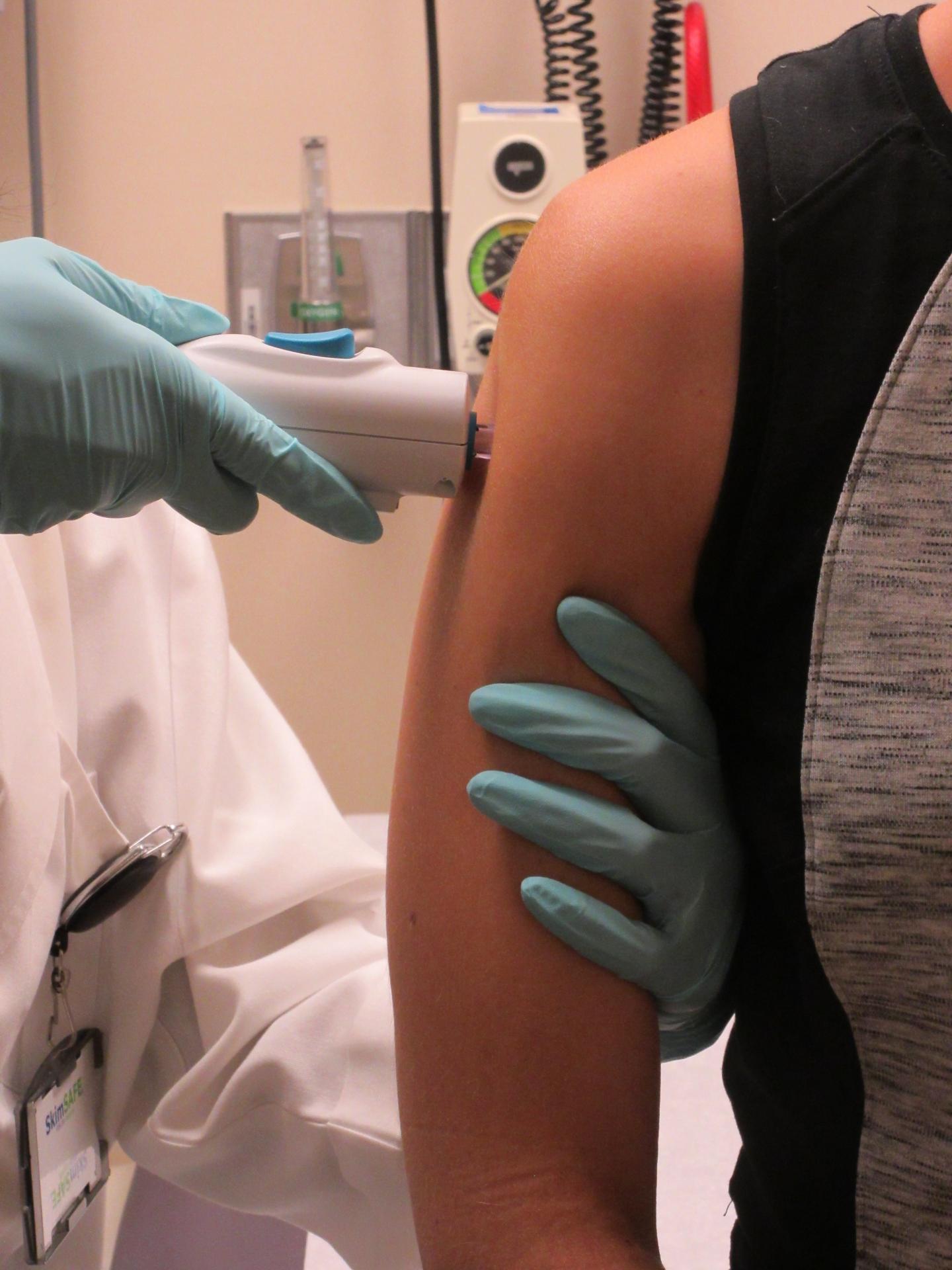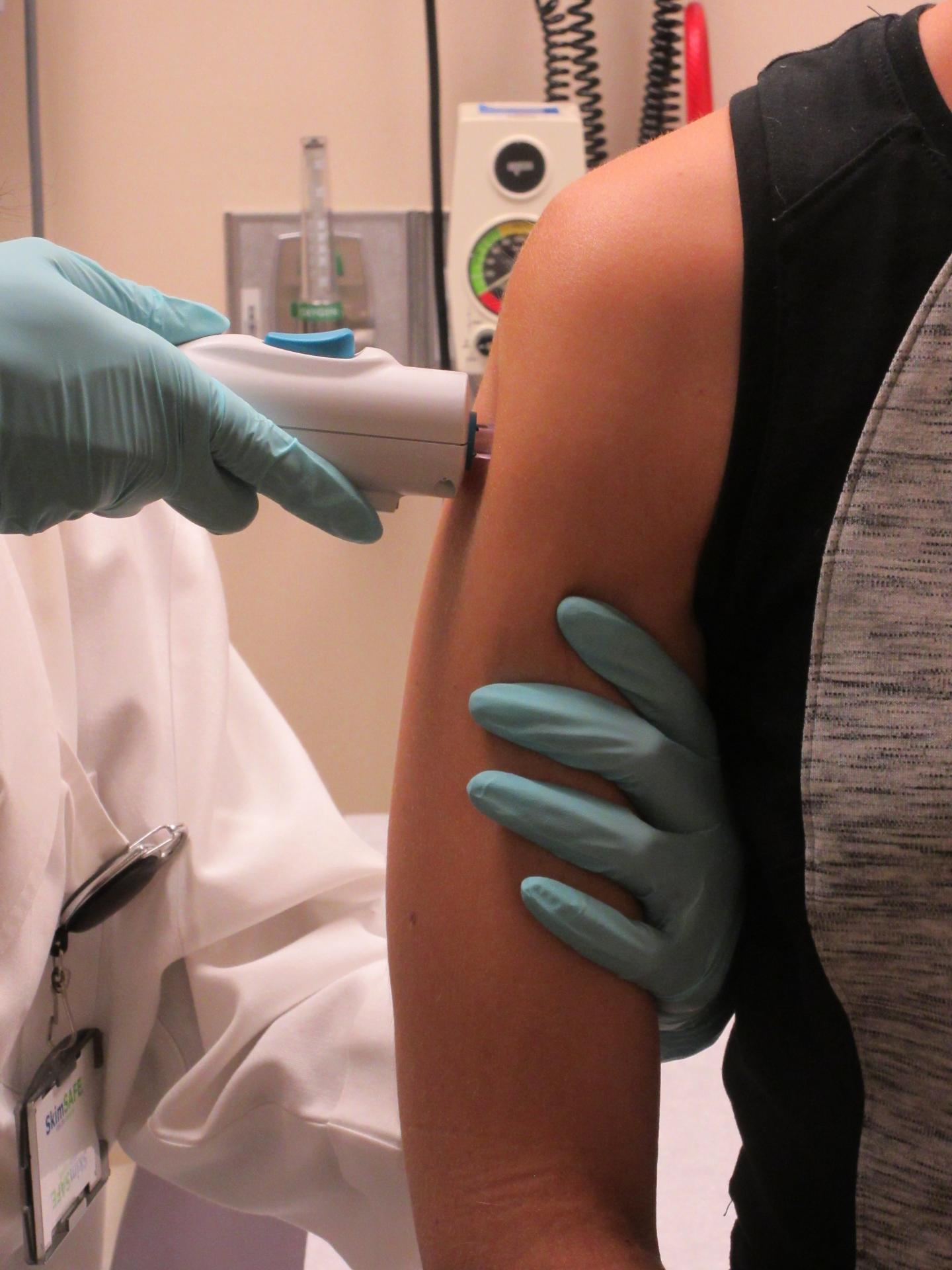
The National Institute of Allergy and Infectious Diseases (NIAID), part of the National Institutes of Health, has launched a clinical trial of a vaccine candidate intended to prevent Zika virus infection. The early-stage study will evaluate the experimental vaccine's safety and ability to generate an immune system response in participants. At least 80 healthy volunteers ages 18-35 years at three study sites in the United States, including the NIH Clinical Center in Bethesda, Maryland, are expected to participate in the trial. Scientists at NIAID's Vaccine Research Center (VRC) developed the investigational vaccine–called the NIAID Zika virus investigational DNA vaccine–earlier this year.
The study is part of the U.S. government response to the ongoing outbreak of Zika virus in the Americas. According to the Centers for Disease Control and Prevention, more than 50 countries and territories have active Zika virus transmission. In the United States and its territories, more than 6,400 Zika cases have been reported. Although Zika infections are usually asymptomatic, some people experience mild illness lasting about a week. However, Zika virus infection during pregnancy can cause a serious birth defect called microcephaly, as well as other severe fetal defects of the brain and other organs. There are no vaccines or specific therapeutics to prevent or treat Zika virus disease.
"A safe and effective vaccine to prevent Zika virus infection and the devastating birth defects it causes is a public health imperative," said NIAID Director Anthony S. Fauci, M.D. "NIAID worked expeditiously to ready a vaccine candidate, and results in animal testing have been very encouraging. We are pleased that we are now able to proceed with this initial study in people. Although it will take some time before a vaccine against Zika is commercially available, the launch of this study is an important step forward."
The NIAID Zika virus investigational DNA vaccine approach is similar to that used for another investigational vaccine developed by NIAID for West Nile virus. That vaccine candidate was found to be safe and induced an immune response when tested in a Phase 1 clinical trial.
The investigational Zika vaccine includes a small, circular piece of DNA–called a plasmid–that scientists engineered to contain genes that code for proteins of the Zika virus. When the vaccine is injected into the arm muscle, cells read the genes and make Zika virus proteins, which self-assemble into virus-like particles. The body mounts an immune response to these particles, including neutralizing antibodies and T cells. DNA vaccines do not contain infectious material–so they cannot cause a vaccinated individual to become infected with Zika–and have been shown to be safe in previous clinical trials for other diseases.
"A team of scientists here at NIAID worked tirelessly to rapidly develop this vaccine for clinical testing," said John Mascola, M.D., director of NIAID's VRC. "DNA or gene-based vaccines induce antibodies, but they also can activate the cell-mediated immune response, which ultimately could yield strong and durable protection against disease."
The Phase 1 clinical trial, called VRC 319, is led by Julie E. Ledgerwood, D.O., chief of the VRC's clinical trials program. Volunteers will be divided randomly into four study groups of 20 people each. After enrollment, all participants will receive a vaccination at their first visit via a needle-free injector that pushes the vaccine fluid into the arm muscle. Half of the participants will receive one additional vaccination eight weeks or 12 weeks later. The remaining participants will receive two additional vaccinations: one group of 20 participants will receive a second vaccine at week four and a third at week eight; the other group of 20 participants will receive a second vaccine at week four and a third at week 20. All participants will receive the same dose at each vaccination.
Following each vaccination, participants will remain at the study site for observation for a minimum of 30 minutes so clinicians can monitor for any adverse reactions. Participants will receive a diary card to use at home to record their temperature and any symptoms for seven days following each vaccination.
All participants will return for follow-up visits within a 44-week time period after the first vaccination so investigators can monitor their health to determine if the vaccine is safe. The study team will review patient data daily and weekly to monitor safety. A Protocol Safety Review Team will also conduct formal interim safety reviews.
At follow-up visits, investigators will also take blood samples for laboratory testing to measure the immune response to the vaccine. Participants will be asked to return for two follow-up visits at 18 months and two years following the initial vaccination so investigators can obtain additional blood samples to assess the durability of the immune response.
Other study sites include the Center for Vaccine Development at the University of Maryland School of Medicine's Institute for Global Health in Baltimore, and Emory University in Atlanta. Initial safety and immunogenicity data from the Phase 1 trial are expected by the end of 2016. If results show a favorable safety profile and immune response, NIAID plans to initiate a Phase 2 trial in Zika-endemic countries in early 2017.
###
For more information about the early-stage clinical trial, see Questions and Answers: Phase 1 Clinical Trial of NIAID Zika Virus Investigational DNA Vaccine, and ClinicalTrials.gov (identifier NCT02840487).
NIAID conducts and supports research–at NIH, throughout the United States, and worldwide–to study the causes of infectious and immune-mediated diseases, and to develop better means of preventing, diagnosing and treating these illnesses. News releases, fact sheets and other NIAID-related materials are available on the NIAID website.
About the National Institutes of Health (NIH): NIH, the nation's medical research agency, includes 27 Institutes and Centers and is a component of the U.S. Department of Health and Human Services. NIH is the primary federal agency conducting and supporting basic, clinical, and translational medical research, and is investigating the causes, treatments, and cures for both common and rare diseases. For more information about NIH and its programs, visit http://www.nih.gov.
NIH…Turning Discovery Into Health®
Media Contact
Jennifer Routh
[email protected]
301-402-1663
@NIAIDNews
http://www.niaid.nih.gov





